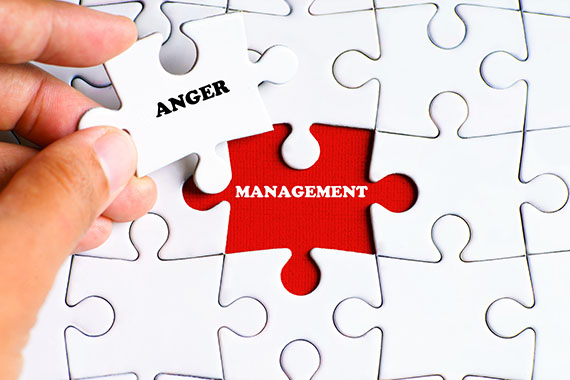
Like any emotion, anger is usually brief and transient, but, like other emotions, anger may also be prolonged, recurrent and problematic.
Changing emotions and shifting moods are normal part of healthy human life. Anger is a normal emotion. At times we all need to shout "stop!"
Emotions are fluctuating, or changing, expressions of intense subjective feelings. Moods are persistent, subjective sensations underlying emotional expression. The emotion of fear may be underpinned by an anxious mood. Sadness is an emotion often expressing a mood of depression. Anger is an emotion expressing a mood of rage. All of these emotions may be healthy, coherent, appropriate and even essential.
When anger is persistent or when it is associated with antisocial behaviour, it becomes a recognisable behavioural problem. This type of anger may be directed towards the self or others, and it may be expressed in many forms, conscious or unconscious, verbal or physical.
Anger of this kind is a common problem at home and in wider society. It often emerges where we work and where we play. It may seem subjectively justified, but, objectively, it is often misplaced, indiscriminate and disproportionate. Anger of this kind is exacerbated, or made worse, by tiredness or exhaustion, frustration, physical illness or substance misuse.
Each of us could learn a better way to deal with our anger. Unmodified expression of anger is generally destructive. Simple strategies may be helpful such as “time out” (in which we determine to avoid impulsive responses to anger). Resolution of anger is also helped by willingness to reflect or to address underlying precipitants.
Our minds work in fascinating hidden ways. Healthy emotions, positive or negative, are commonly displaced, transferred or denied. Like dreams, they include expressions of feelings long distant from their original source. Freud and his colleagues described these psychological mechanisms of displacement and denial as defence strategies aimed at protecting each of us from the terrible full force of our anger and from our unconscious aggression.
Mental health difficulties are more likely to arise when we can find no legitimate expression for our anger or when we find no authentic avenue for its resolution. Without a psychological response to emotional problems, or persistent and problematic anger, we risk the experience of other destructive emotions such as emotional numbing, anxiety, substance abuse, depression, and even suicidality.
Anger is rarely an indication of mental health disorder. Where behavioural problems such as anger are indicative of underlying mental health disorder, these may benefit from psychological treatment or learning therapy. Large numbers of talking therapies have been described, but, sadly, these remain poorly understood by the general public and their availability is still far too limited.
Modern mental healthcare focuses on the importance of learning as a route to recovery from mental health difficulties. “Learning” has replaced “insight” as the holy grail of psychotherapeutic endeavour. The greatest advances in mental healthcare over the past twenty years have been in the area of psychotherapy. These treatments, commonly called “talking therapies”, offer measurable strategies for mental health recovery and many have been tested and proven to be effective in real clinical practice.
Behaviour Therapy
Learning-based psychotherapy started with the first generation known as Behaviour Therapy (BT). BT was the first talking therapy to demonstrate that learning (or more technically “conditioning”) was an effective way of modifying illness behaviours. This is still a very effective therapy for a wide range of issues, and vast research shows it benefits particularly in anxious and phobic problems.
Cognitive Behavioural Therapy
The second generation of talking treatment was Cognitive Behavioural Therapy (CBT). This treatment harnessed all the benefits of BT, but, in addition, applied these learning skills to less tangible issues, such as problems with feelings, emotions and moods. Previously, these cognitive and emotional elements of mental health were thought inaccessible to learning therapy. Research clearly shows that CBT is safe and effective for the vast majority of depressive and obsessive compulsive disorders.
Third Generation of Learning-Based Psychotherapy
The most recent talking therapies are known as the Third Generation of Learning-Based Psychotherapy. These include therapies such as Interpersonal Therapy (IPT) and Dialectical Behaviour Therapy (DBT). These therapies bring a personal skillset to the learning of recovery. This includes learning to deal with destructive emotions and behaviour, such as anger and its causes.
Mental healthcare is frustrated by lack of awareness of these psychological treatments and recovery is limited by poor access to these proven “talking” remedies.
If you would like more information or support about this or another mental health difficulty, visit our Frequently Asked Questions (FAQs) or check the Health Service Executive's anger management information page.
Author
Prof Jim Lucey
Professor Jim Lucey was Medical Director of St Patrick’s Mental Health Services (SPMHS) from 2008 to 2019, and a Consultant Psychiatrist with our team until 2023.
He is Clinical Professor of Psychiatry at Trinity College Dublin. He has been working for more than 30 years with patients experiencing mental health difficulties.
During his time with us in SPMHS, in addition to medical management, Professor Lucey specialised in the assessment, diagnosis and management of Obsessive Compulsive Disorder (OCD) and other anxiety disorders. He gave public lectures and was a regular broadcaster on mental health matters on RTÉ radio, featuring on Today with Sean O’Rourke for many years.

